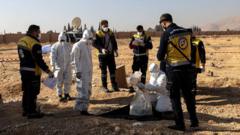The UNHCR’s alarm followed the reported abduction of Turkish nationals in Nairobi, raising serious questions about Kenya’s adherence to international refugee laws.
UN Raises Alarm Over Return of Turkish Refugees from Kenya

UN Raises Alarm Over Return of Turkish Refugees from Kenya
The UN Refugee Agency expresses strong concerns regarding the repatriation of refugees back to Turkey, citing potential threats to their safety.
In a move that has drawn significant attention and concern, the United Nations Refugee Agency (UNHCR) has voiced its deep worries following the repatriation of four Turkish refugees from Kenya. The act was orchestrated at the behest of Turkey’s government, with Kenya’s foreign ministry confirming the move and citing the historical ties between the two nations.
Reports emerged indicating that multiple individuals, mostly Turkish nationals, were allegedly kidnapped in Nairobi recently. A British citizen linked to the incident told the BBC that he was taken along with other Turkish nationals by armed men but was released after eight hours upon presenting his British passport.
In response to these developments, the UNHCR emphasized the importance of upholding international legal standards, particularly the principle of non-refoulement, which forbids returning refugees to countries where they may face persecution. The UN agency reiterated its call for Kenya to adhere to these obligations in light of potential threats to the refugees’ lives or freedom upon their return to Turkey.
Kenya’s foreign ministry defended its actions by highlighting the “robust historical and strategic relationship” with Turkey, assuring that the repatriated individuals would be treated with dignity. The four refugees are reported to be associated with the Gülen movement, a group previously accused by Turkish authorities of orchestrating a coup attempt in 2016, leading to its classification as a terrorist organization.
Though Turkish officials have yet to provide commentary on the repatriation, local legal representatives in Kenya have expressed concern about the treatment of the individuals as "victims of political victimization," urging caution among airlines in transporting them.
Following the abduction incidents, the British Foreign Office confirmed its involvement in providing consular assistance. Meanwhile, Kenyan authorities have initiated an investigation into the reported kidnappings, with police indicating that multiple armed individuals were involved in these incidents.
Critics, including representatives from Amnesty International, have articulated serious concerns about the implications of these abductions and the safety of asylum seekers in Kenya.
With a deepening relationship between Turkey and African nations gaining momentum over the past two decades, the historical context between Kenya and Turkey has also been marked by notable past events, including the apprehension of Kurdish leader Abdullah Öcalan in Kenya in 1999.
This situation continues to evolve, with the UNHCR poised to monitor the developments closely and provide further information as it becomes available.
Reports emerged indicating that multiple individuals, mostly Turkish nationals, were allegedly kidnapped in Nairobi recently. A British citizen linked to the incident told the BBC that he was taken along with other Turkish nationals by armed men but was released after eight hours upon presenting his British passport.
In response to these developments, the UNHCR emphasized the importance of upholding international legal standards, particularly the principle of non-refoulement, which forbids returning refugees to countries where they may face persecution. The UN agency reiterated its call for Kenya to adhere to these obligations in light of potential threats to the refugees’ lives or freedom upon their return to Turkey.
Kenya’s foreign ministry defended its actions by highlighting the “robust historical and strategic relationship” with Turkey, assuring that the repatriated individuals would be treated with dignity. The four refugees are reported to be associated with the Gülen movement, a group previously accused by Turkish authorities of orchestrating a coup attempt in 2016, leading to its classification as a terrorist organization.
Though Turkish officials have yet to provide commentary on the repatriation, local legal representatives in Kenya have expressed concern about the treatment of the individuals as "victims of political victimization," urging caution among airlines in transporting them.
Following the abduction incidents, the British Foreign Office confirmed its involvement in providing consular assistance. Meanwhile, Kenyan authorities have initiated an investigation into the reported kidnappings, with police indicating that multiple armed individuals were involved in these incidents.
Critics, including representatives from Amnesty International, have articulated serious concerns about the implications of these abductions and the safety of asylum seekers in Kenya.
With a deepening relationship between Turkey and African nations gaining momentum over the past two decades, the historical context between Kenya and Turkey has also been marked by notable past events, including the apprehension of Kurdish leader Abdullah Öcalan in Kenya in 1999.
This situation continues to evolve, with the UNHCR poised to monitor the developments closely and provide further information as it becomes available.


















